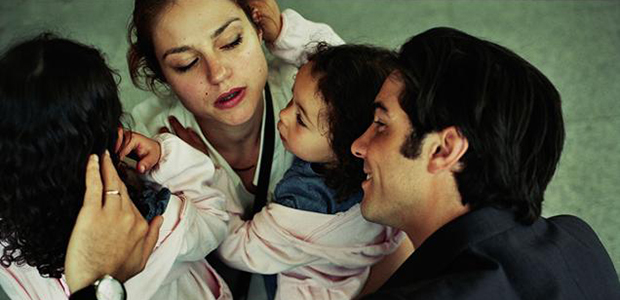
Our Children (A Perdre La Raison) conveys the anxiety and pressure of raising a family with great seriousness. Based on the real life incident of a woman who killed her children because she felt trapped in a house she shared with her husband and his controlling, domineering father figure, the film builds on the toll that many years of marriage and parenting take on her and dexterously communicates the sensation of entrapment of such a situation.
Murielle is an elementary school teacher in Brussels who falls in love with and eventually marries Moroccan immigrant Mounir. They make a modest living but are financially supported by André, Mounir’s brother in law, by a paper marriage to his sister, but a true father figure who raised him and allows him to practice at his clinic. The trio seems to get along adequately, if not exceptionally well, but soon a daughter is born, followed by another, till the family has expanded to four children and Murielle can no longer take it. Part of it has to do with André’s interfering nature—realistically, he is the true man of the house and Mounir’s lack of control over their lives combined with his siding with André start taking their toll on his marriage.
As a chamber drama, Our Children builds on the suffocation of Murielle’s existence one day at a time and director Joachim Lafosse’s extreme close-ups and tight framing accentuates this well. The passage of time in the film is expertly controlled to snowball into a pent up situation that feels like it’s going to explode. Anyone who has experienced parenthood will relate to the film’s unglamourous view of child-rearing and the script never takes sides with anyone, making the predicament seem even more dismal. In his own way, André is right in expecting his ‘son’ to be there for him in old age and Mounir’s support of this view is understandable. Together, Tahar Rahim and Niels Arestrup seem to relive their surrogate father-son roles from The Prophet, but the film really belongs to Émilie Dequenne who fulfills on her promise of being called a great actress when she debuted in the Dardenne’s riveting Rosetta a decade ago. Her breakdown—mental, emotional, physical—becomes the films performance centerpiece and her transformation from beautiful to browbeaten deservedly won her the best actress award at Cannes this year.
Though the films conclusion is foregone (the opening shows 4 coffins being readied for transport at an airport) it never takes away from the feeling of dread that the last act manages to sustain. Our Children also gets right the concerns of inter-faith, cross cultural relationships and a dialogue between André and Mounir about Mounir’s hypocritical desire to settle down in Morocco despite calling Belgium his home seems to express the harsh truth for second generation immigrants the world over.
Rating: 



